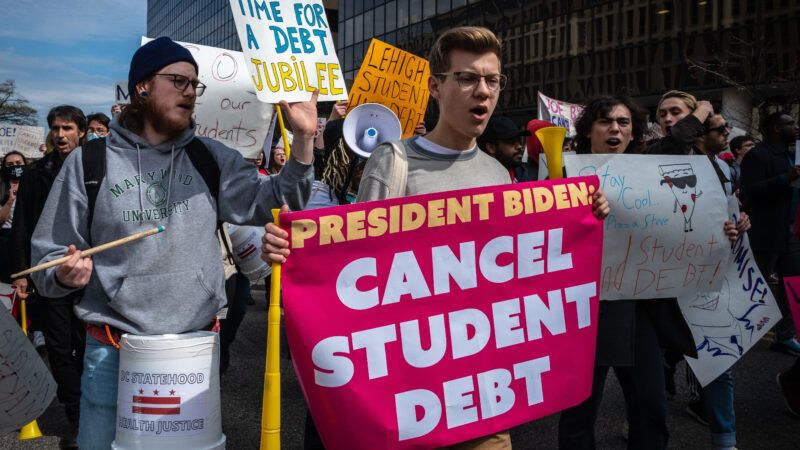Supreme Court to Biden: You Can't Just Forgive $400 Billion in Student Loan Debt Without Asking Congress
Nancy Pelosi agrees.

The Supreme Court has struck down President Joe Biden's student loan forgiveness plan, ruling 6–3 that the plan, which had promised up to $20,000 in federal student loan forgiveness per borrower, was not authorized under existing law. It was widely expected that the Court would halt Biden's proposal.
Last August, Biden announced that the Department of Education would launch a sweeping student loan forgiveness plan, forgiving $10,000 in federal student loan debt for single borrowers making up to $125,000 per year and married couples making up to $250,000. Borrowers who received Pell Grants would be eligible for $20,000 in loan forgiveness.
Almost immediately, the plan was met with legal challenges. The Supreme Court agreed to hear two cases, one filed jointly by six Republican-led states that wished to block the measure, and another filed in Texas by two state residents who were not eligible for the maximum relief provided by the plan.
The Supreme Court unanimously ruled that the plaintiffs in the Texas case had no standing. But it ruled in favor of the coalition of Republican states, deciding that Biden's attempt at legitimizing the proposal through the HEROES Act—and the billions in federal spending that it would entail—fell flat on the merits and was unconstitutional.
The HEROES Act is a 9/11-era law designed to allow the government to grant student loan relief to soldiers who withdrew from college to enter active duty. The law gives the Department of Education the authority to "waive or modify" any "requirement or regulation" of a federal student loan plan for individuals who "suffered direct economic hardship as a direct result of a war or other military operation or national emergency."
While the Department of Education argued that this granted it broad authority to cancel student loan debt, citing COVID-19 as the "national emergency" in question, the Supreme Court didn't buy it. "The Secretary's plan has 'modified' the cited provisions only in the same sense that 'the French Revolution "modified" the status of the French nobility,'" wrote Chief Justice John Roberts in the majority opinion. "It has abolished them and supplanted them with a new regime entirely."
Roberts continued: "The Secretary has not truly waived or modified the provisions in the Education Act authorizing specific and limited forgiveness of student loans. Those provisions remain safely intact in the U. S. Code, where they continue to operate in full force. What the Secretary has actually done is draft a new section of the Education Act from scratch by 'waiving' provisions root and branch and then filling the empty space with radically new text."
Roberts further asserted that only Congress could authorize such extensive student loan forgiveness. He even cited former Speaker of the House Nancy Pelosi (D–Calif.), who told reporters in 2021, "People think that the President of the United States has the power for debt forgiveness. He does not. He can postpone. He can delay. But he does not have that power. That has to be an act of Congress."
The ruling marks a decisive halt to a proposal that would have cost taxpayers an estimated $400 billion. While higher education—and particularly graduate school—is too expensive for many students, loan forgiveness does nothing to address the root cause of inflated college tuition. Instead, Biden's plan would have primarily benefited wealthier Americans, and it would have resulted in outstanding student loan debt returning to current levels by 2028.
Policies that restrict the supply of federal student loans—for example, lowering the cap on the amounts individuals can borrow, or refusing to provide federal loans for programs and colleges that leave students financially worse off—are the clearest way to improve the situation in the long term. Unfortunately, long-term solutions aren't nearly as attractive as the short-term appeal of giving a payout to a group of Americans that also happens to comprise a significant part of the Democratic base, with the announcement coming shortly before the 2022 midterms.
From the beginning, Biden's plan was doomed to fail. As Roberts wrote, "Our precedent— old and new—requires that Congress speak clearly before a Department Secretary can unilaterally alter large sections of the American economy." Biden surely knew—or should have known—this. But instead of attempting to enact his policy goals through Congress, he embarked on a 10-month boondoggle that has met its predictable end.


Show Comments (133)